Educational Challenges and Experiences of Migrant Children in UK
VerifiedAdded on 2022/08/12
|10
|2992
|31
Essay
AI Summary
This essay examines the multifaceted educational challenges faced by migrant children, primarily within the UK context, emphasizing the impact of globalization on migration and the pursuit of quality education. It highlights the disruptions in education caused by resettlement, including the need to adapt to new languages, educational systems, and cultural environments. The essay discusses the increased risk of academic difficulties, anxiety, and other psychological issues among migrant children. It further explores factors such as language barriers, socio-economic disadvantages, family background, and the role of parental involvement in influencing academic outcomes. The study also addresses the importance of school support, including language classes, a diverse environment, and socio-psychological assistance to help migrant children integrate and succeed in their education. The essay underscores the need for policies and educational practices that address the unique needs of migrant children to ensure their academic success and overall well-being.
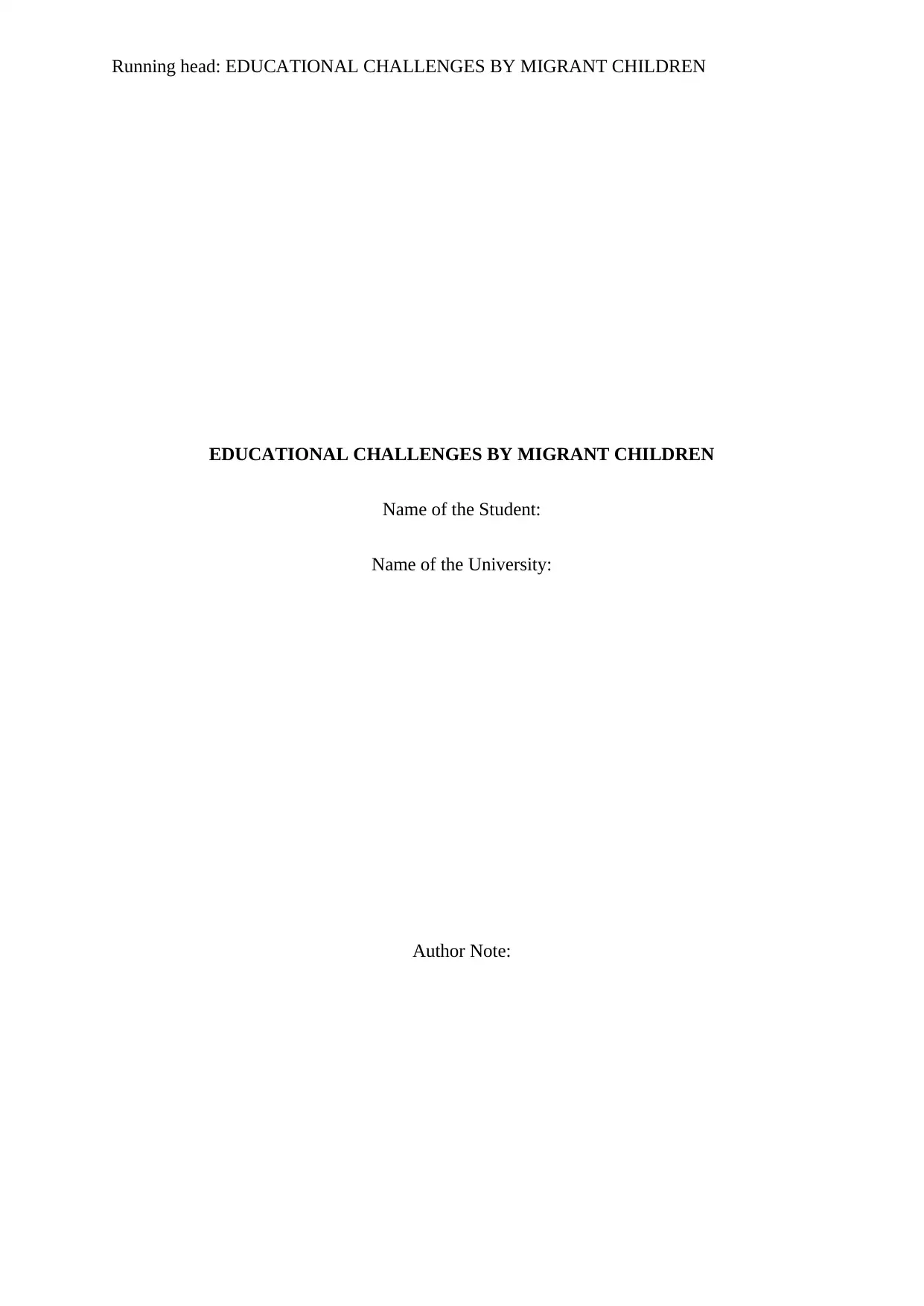
Running head: EDUCATIONAL CHALLENGES BY MIGRANT CHILDREN
EDUCATIONAL CHALLENGES BY MIGRANT CHILDREN
Name of the Student:
Name of the University:
Author Note:
EDUCATIONAL CHALLENGES BY MIGRANT CHILDREN
Name of the Student:
Name of the University:
Author Note:
Paraphrase This Document
Need a fresh take? Get an instant paraphrase of this document with our AI Paraphraser
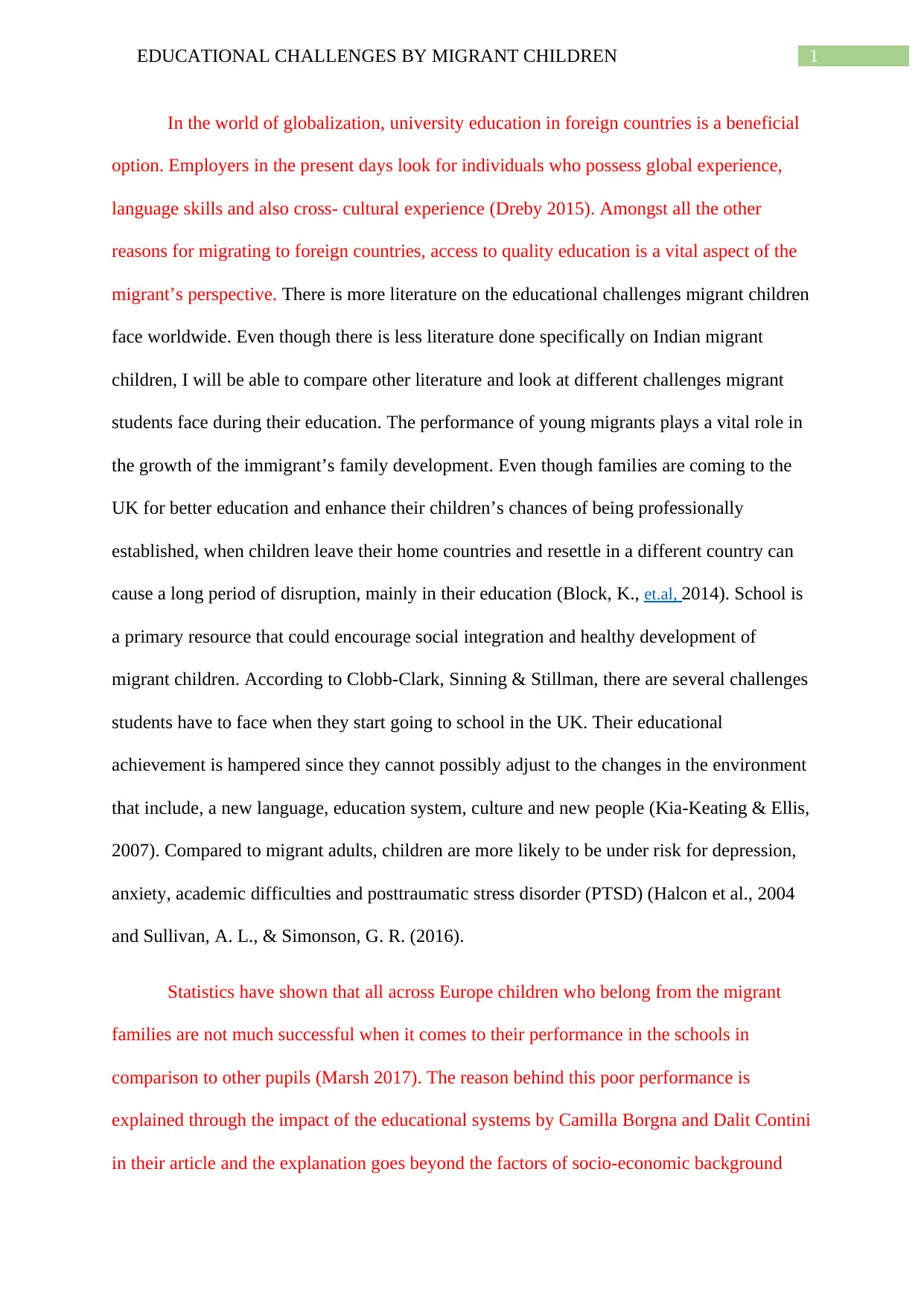
1EDUCATIONAL CHALLENGES BY MIGRANT CHILDREN
In the world of globalization, university education in foreign countries is a beneficial
option. Employers in the present days look for individuals who possess global experience,
language skills and also cross- cultural experience (Dreby 2015). Amongst all the other
reasons for migrating to foreign countries, access to quality education is a vital aspect of the
migrant’s perspective. There is more literature on the educational challenges migrant children
face worldwide. Even though there is less literature done specifically on Indian migrant
children, I will be able to compare other literature and look at different challenges migrant
students face during their education. The performance of young migrants plays a vital role in
the growth of the immigrant’s family development. Even though families are coming to the
UK for better education and enhance their children’s chances of being professionally
established, when children leave their home countries and resettle in a different country can
cause a long period of disruption, mainly in their education (Block, K., et.al, 2014). School is
a primary resource that could encourage social integration and healthy development of
migrant children. According to Clobb-Clark, Sinning & Stillman, there are several challenges
students have to face when they start going to school in the UK. Their educational
achievement is hampered since they cannot possibly adjust to the changes in the environment
that include, a new language, education system, culture and new people (Kia-Keating & Ellis,
2007). Compared to migrant adults, children are more likely to be under risk for depression,
anxiety, academic difficulties and posttraumatic stress disorder (PTSD) (Halcon et al., 2004
and Sullivan, A. L., & Simonson, G. R. (2016).
Statistics have shown that all across Europe children who belong from the migrant
families are not much successful when it comes to their performance in the schools in
comparison to other pupils (Marsh 2017). The reason behind this poor performance is
explained through the impact of the educational systems by Camilla Borgna and Dalit Contini
in their article and the explanation goes beyond the factors of socio-economic background
In the world of globalization, university education in foreign countries is a beneficial
option. Employers in the present days look for individuals who possess global experience,
language skills and also cross- cultural experience (Dreby 2015). Amongst all the other
reasons for migrating to foreign countries, access to quality education is a vital aspect of the
migrant’s perspective. There is more literature on the educational challenges migrant children
face worldwide. Even though there is less literature done specifically on Indian migrant
children, I will be able to compare other literature and look at different challenges migrant
students face during their education. The performance of young migrants plays a vital role in
the growth of the immigrant’s family development. Even though families are coming to the
UK for better education and enhance their children’s chances of being professionally
established, when children leave their home countries and resettle in a different country can
cause a long period of disruption, mainly in their education (Block, K., et.al, 2014). School is
a primary resource that could encourage social integration and healthy development of
migrant children. According to Clobb-Clark, Sinning & Stillman, there are several challenges
students have to face when they start going to school in the UK. Their educational
achievement is hampered since they cannot possibly adjust to the changes in the environment
that include, a new language, education system, culture and new people (Kia-Keating & Ellis,
2007). Compared to migrant adults, children are more likely to be under risk for depression,
anxiety, academic difficulties and posttraumatic stress disorder (PTSD) (Halcon et al., 2004
and Sullivan, A. L., & Simonson, G. R. (2016).
Statistics have shown that all across Europe children who belong from the migrant
families are not much successful when it comes to their performance in the schools in
comparison to other pupils (Marsh 2017). The reason behind this poor performance is
explained through the impact of the educational systems by Camilla Borgna and Dalit Contini
in their article and the explanation goes beyond the factors of socio-economic background
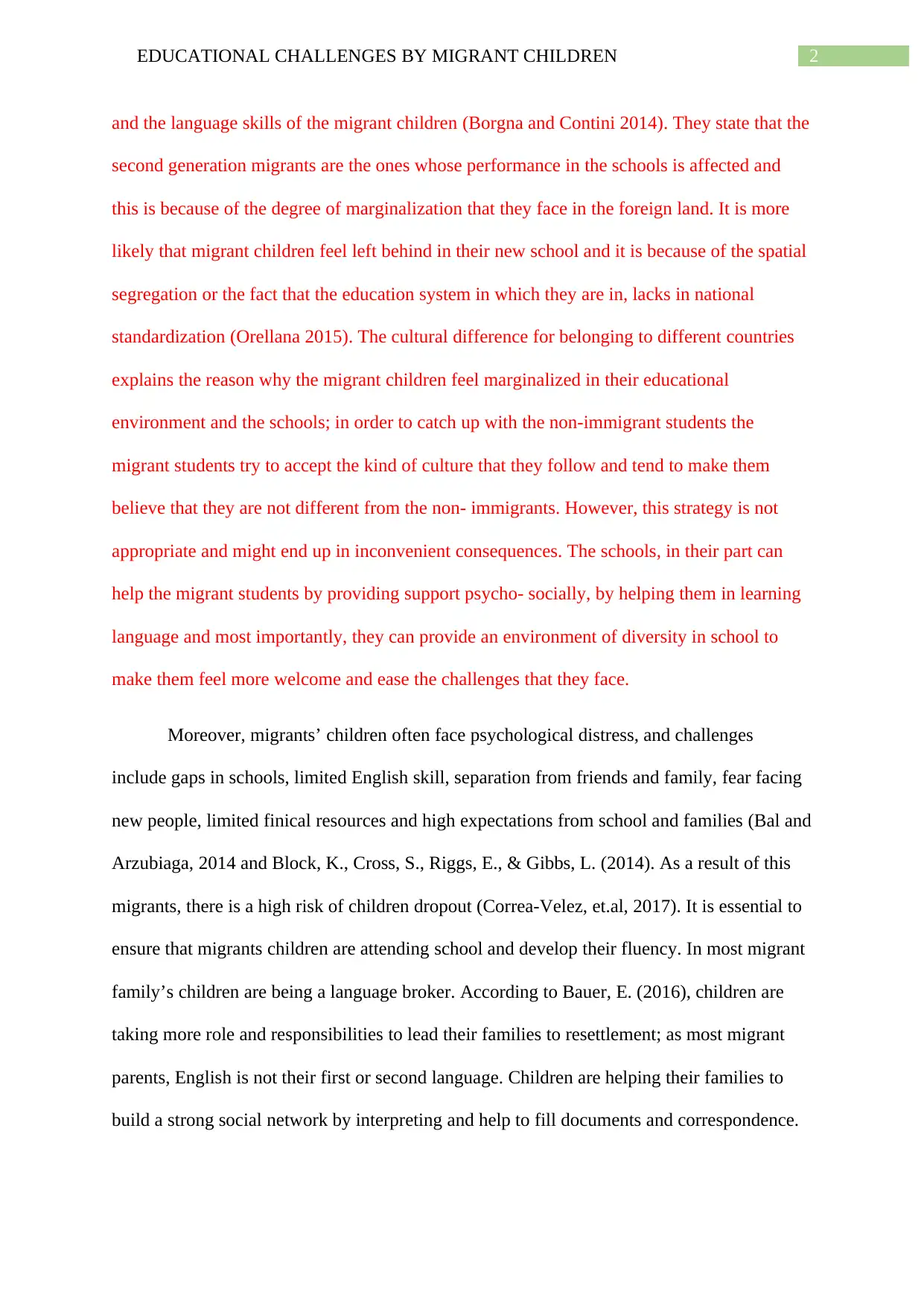
2EDUCATIONAL CHALLENGES BY MIGRANT CHILDREN
and the language skills of the migrant children (Borgna and Contini 2014). They state that the
second generation migrants are the ones whose performance in the schools is affected and
this is because of the degree of marginalization that they face in the foreign land. It is more
likely that migrant children feel left behind in their new school and it is because of the spatial
segregation or the fact that the education system in which they are in, lacks in national
standardization (Orellana 2015). The cultural difference for belonging to different countries
explains the reason why the migrant children feel marginalized in their educational
environment and the schools; in order to catch up with the non-immigrant students the
migrant students try to accept the kind of culture that they follow and tend to make them
believe that they are not different from the non- immigrants. However, this strategy is not
appropriate and might end up in inconvenient consequences. The schools, in their part can
help the migrant students by providing support psycho- socially, by helping them in learning
language and most importantly, they can provide an environment of diversity in school to
make them feel more welcome and ease the challenges that they face.
Moreover, migrants’ children often face psychological distress, and challenges
include gaps in schools, limited English skill, separation from friends and family, fear facing
new people, limited finical resources and high expectations from school and families (Bal and
Arzubiaga, 2014 and Block, K., Cross, S., Riggs, E., & Gibbs, L. (2014). As a result of this
migrants, there is a high risk of children dropout (Correa-Velez, et.al, 2017). It is essential to
ensure that migrants children are attending school and develop their fluency. In most migrant
family’s children are being a language broker. According to Bauer, E. (2016), children are
taking more role and responsibilities to lead their families to resettlement; as most migrant
parents, English is not their first or second language. Children are helping their families to
build a strong social network by interpreting and help to fill documents and correspondence.
and the language skills of the migrant children (Borgna and Contini 2014). They state that the
second generation migrants are the ones whose performance in the schools is affected and
this is because of the degree of marginalization that they face in the foreign land. It is more
likely that migrant children feel left behind in their new school and it is because of the spatial
segregation or the fact that the education system in which they are in, lacks in national
standardization (Orellana 2015). The cultural difference for belonging to different countries
explains the reason why the migrant children feel marginalized in their educational
environment and the schools; in order to catch up with the non-immigrant students the
migrant students try to accept the kind of culture that they follow and tend to make them
believe that they are not different from the non- immigrants. However, this strategy is not
appropriate and might end up in inconvenient consequences. The schools, in their part can
help the migrant students by providing support psycho- socially, by helping them in learning
language and most importantly, they can provide an environment of diversity in school to
make them feel more welcome and ease the challenges that they face.
Moreover, migrants’ children often face psychological distress, and challenges
include gaps in schools, limited English skill, separation from friends and family, fear facing
new people, limited finical resources and high expectations from school and families (Bal and
Arzubiaga, 2014 and Block, K., Cross, S., Riggs, E., & Gibbs, L. (2014). As a result of this
migrants, there is a high risk of children dropout (Correa-Velez, et.al, 2017). It is essential to
ensure that migrants children are attending school and develop their fluency. In most migrant
family’s children are being a language broker. According to Bauer, E. (2016), children are
taking more role and responsibilities to lead their families to resettlement; as most migrant
parents, English is not their first or second language. Children are helping their families to
build a strong social network by interpreting and help to fill documents and correspondence.
⊘ This is a preview!⊘
Do you want full access?
Subscribe today to unlock all pages.

Trusted by 1+ million students worldwide
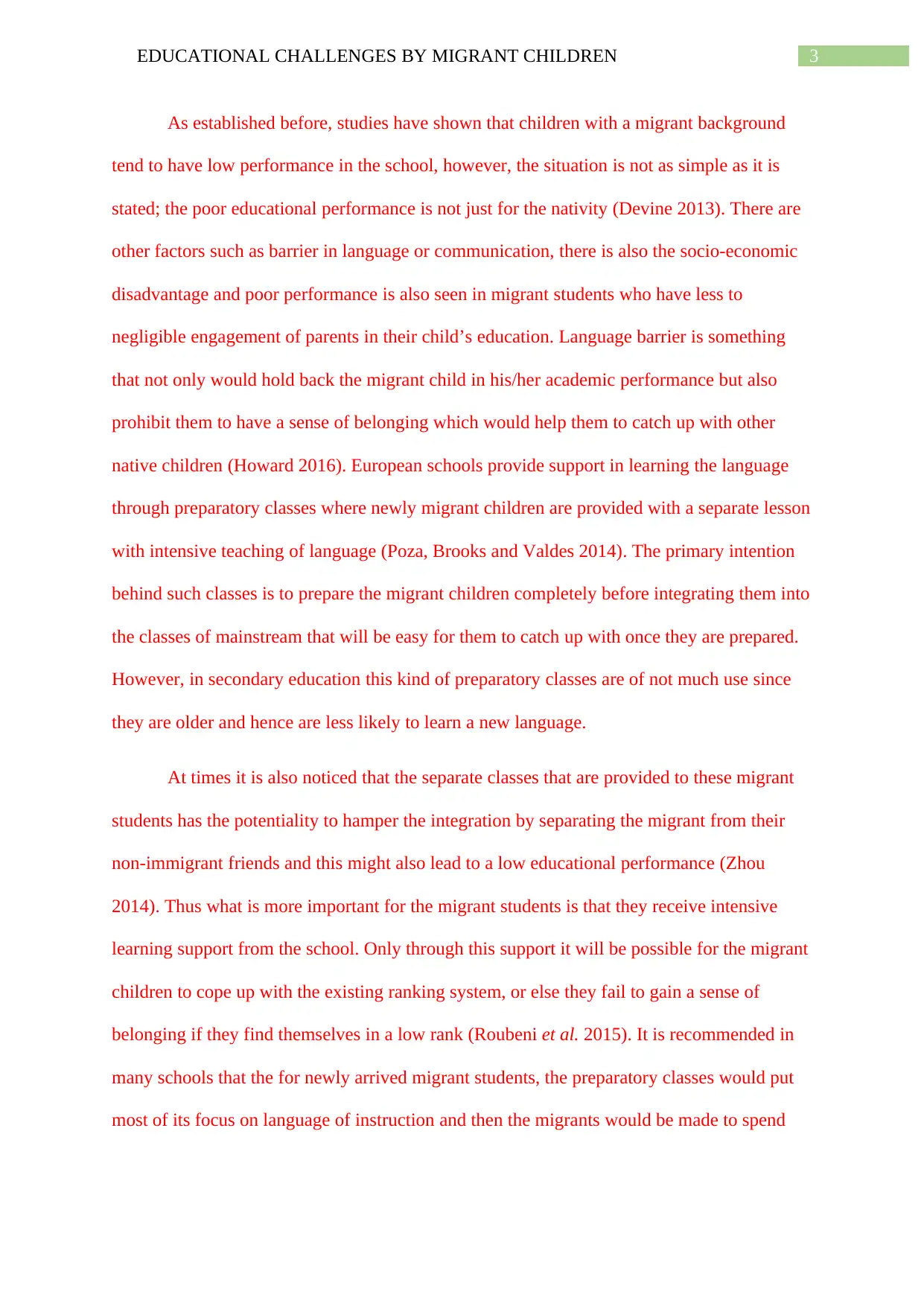
3EDUCATIONAL CHALLENGES BY MIGRANT CHILDREN
As established before, studies have shown that children with a migrant background
tend to have low performance in the school, however, the situation is not as simple as it is
stated; the poor educational performance is not just for the nativity (Devine 2013). There are
other factors such as barrier in language or communication, there is also the socio-economic
disadvantage and poor performance is also seen in migrant students who have less to
negligible engagement of parents in their child’s education. Language barrier is something
that not only would hold back the migrant child in his/her academic performance but also
prohibit them to have a sense of belonging which would help them to catch up with other
native children (Howard 2016). European schools provide support in learning the language
through preparatory classes where newly migrant children are provided with a separate lesson
with intensive teaching of language (Poza, Brooks and Valdes 2014). The primary intention
behind such classes is to prepare the migrant children completely before integrating them into
the classes of mainstream that will be easy for them to catch up with once they are prepared.
However, in secondary education this kind of preparatory classes are of not much use since
they are older and hence are less likely to learn a new language.
At times it is also noticed that the separate classes that are provided to these migrant
students has the potentiality to hamper the integration by separating the migrant from their
non-immigrant friends and this might also lead to a low educational performance (Zhou
2014). Thus what is more important for the migrant students is that they receive intensive
learning support from the school. Only through this support it will be possible for the migrant
children to cope up with the existing ranking system, or else they fail to gain a sense of
belonging if they find themselves in a low rank (Roubeni et al. 2015). It is recommended in
many schools that the for newly arrived migrant students, the preparatory classes would put
most of its focus on language of instruction and then the migrants would be made to spend
As established before, studies have shown that children with a migrant background
tend to have low performance in the school, however, the situation is not as simple as it is
stated; the poor educational performance is not just for the nativity (Devine 2013). There are
other factors such as barrier in language or communication, there is also the socio-economic
disadvantage and poor performance is also seen in migrant students who have less to
negligible engagement of parents in their child’s education. Language barrier is something
that not only would hold back the migrant child in his/her academic performance but also
prohibit them to have a sense of belonging which would help them to catch up with other
native children (Howard 2016). European schools provide support in learning the language
through preparatory classes where newly migrant children are provided with a separate lesson
with intensive teaching of language (Poza, Brooks and Valdes 2014). The primary intention
behind such classes is to prepare the migrant children completely before integrating them into
the classes of mainstream that will be easy for them to catch up with once they are prepared.
However, in secondary education this kind of preparatory classes are of not much use since
they are older and hence are less likely to learn a new language.
At times it is also noticed that the separate classes that are provided to these migrant
students has the potentiality to hamper the integration by separating the migrant from their
non-immigrant friends and this might also lead to a low educational performance (Zhou
2014). Thus what is more important for the migrant students is that they receive intensive
learning support from the school. Only through this support it will be possible for the migrant
children to cope up with the existing ranking system, or else they fail to gain a sense of
belonging if they find themselves in a low rank (Roubeni et al. 2015). It is recommended in
many schools that the for newly arrived migrant students, the preparatory classes would put
most of its focus on language of instruction and then the migrants would be made to spend
Paraphrase This Document
Need a fresh take? Get an instant paraphrase of this document with our AI Paraphraser
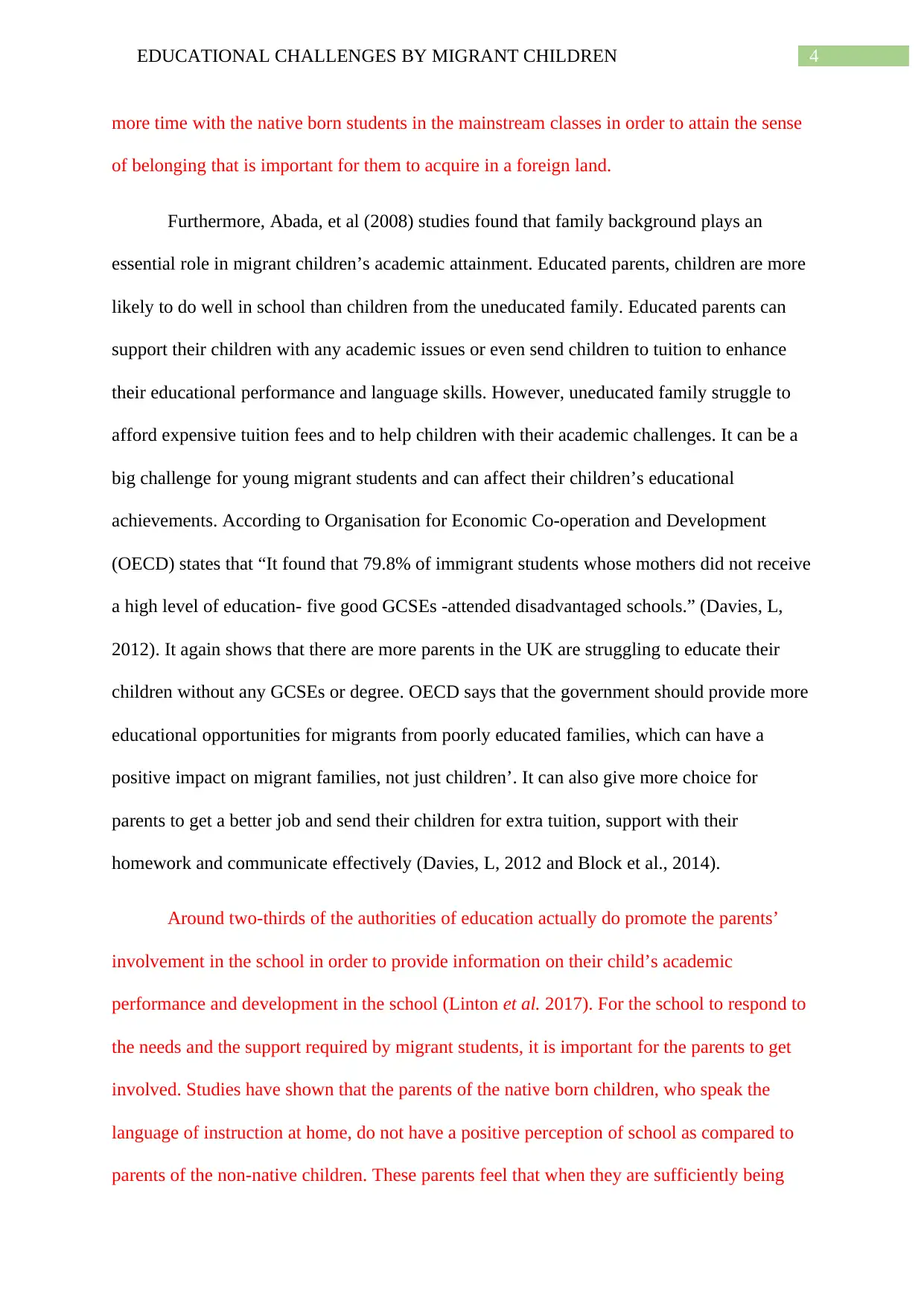
4EDUCATIONAL CHALLENGES BY MIGRANT CHILDREN
more time with the native born students in the mainstream classes in order to attain the sense
of belonging that is important for them to acquire in a foreign land.
Furthermore, Abada, et al (2008) studies found that family background plays an
essential role in migrant children’s academic attainment. Educated parents, children are more
likely to do well in school than children from the uneducated family. Educated parents can
support their children with any academic issues or even send children to tuition to enhance
their educational performance and language skills. However, uneducated family struggle to
afford expensive tuition fees and to help children with their academic challenges. It can be a
big challenge for young migrant students and can affect their children’s educational
achievements. According to Organisation for Economic Co-operation and Development
(OECD) states that “It found that 79.8% of immigrant students whose mothers did not receive
a high level of education- five good GCSEs -attended disadvantaged schools.” (Davies, L,
2012). It again shows that there are more parents in the UK are struggling to educate their
children without any GCSEs or degree. OECD says that the government should provide more
educational opportunities for migrants from poorly educated families, which can have a
positive impact on migrant families, not just children’. It can also give more choice for
parents to get a better job and send their children for extra tuition, support with their
homework and communicate effectively (Davies, L, 2012 and Block et al., 2014).
Around two-thirds of the authorities of education actually do promote the parents’
involvement in the school in order to provide information on their child’s academic
performance and development in the school (Linton et al. 2017). For the school to respond to
the needs and the support required by migrant students, it is important for the parents to get
involved. Studies have shown that the parents of the native born children, who speak the
language of instruction at home, do not have a positive perception of school as compared to
parents of the non-native children. These parents feel that when they are sufficiently being
more time with the native born students in the mainstream classes in order to attain the sense
of belonging that is important for them to acquire in a foreign land.
Furthermore, Abada, et al (2008) studies found that family background plays an
essential role in migrant children’s academic attainment. Educated parents, children are more
likely to do well in school than children from the uneducated family. Educated parents can
support their children with any academic issues or even send children to tuition to enhance
their educational performance and language skills. However, uneducated family struggle to
afford expensive tuition fees and to help children with their academic challenges. It can be a
big challenge for young migrant students and can affect their children’s educational
achievements. According to Organisation for Economic Co-operation and Development
(OECD) states that “It found that 79.8% of immigrant students whose mothers did not receive
a high level of education- five good GCSEs -attended disadvantaged schools.” (Davies, L,
2012). It again shows that there are more parents in the UK are struggling to educate their
children without any GCSEs or degree. OECD says that the government should provide more
educational opportunities for migrants from poorly educated families, which can have a
positive impact on migrant families, not just children’. It can also give more choice for
parents to get a better job and send their children for extra tuition, support with their
homework and communicate effectively (Davies, L, 2012 and Block et al., 2014).
Around two-thirds of the authorities of education actually do promote the parents’
involvement in the school in order to provide information on their child’s academic
performance and development in the school (Linton et al. 2017). For the school to respond to
the needs and the support required by migrant students, it is important for the parents to get
involved. Studies have shown that the parents of the native born children, who speak the
language of instruction at home, do not have a positive perception of school as compared to
parents of the non-native children. These parents feel that when they are sufficiently being
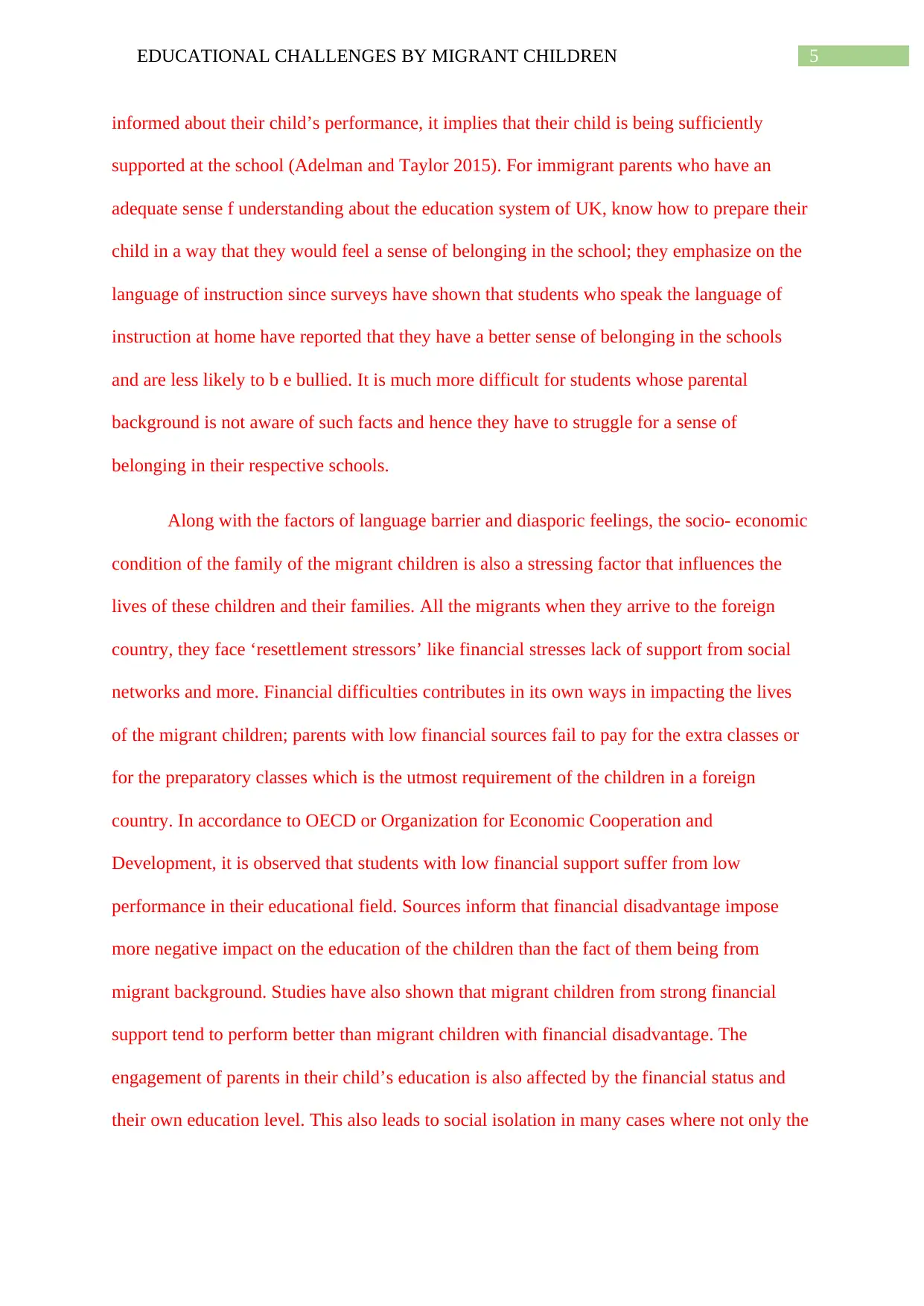
5EDUCATIONAL CHALLENGES BY MIGRANT CHILDREN
informed about their child’s performance, it implies that their child is being sufficiently
supported at the school (Adelman and Taylor 2015). For immigrant parents who have an
adequate sense f understanding about the education system of UK, know how to prepare their
child in a way that they would feel a sense of belonging in the school; they emphasize on the
language of instruction since surveys have shown that students who speak the language of
instruction at home have reported that they have a better sense of belonging in the schools
and are less likely to b e bullied. It is much more difficult for students whose parental
background is not aware of such facts and hence they have to struggle for a sense of
belonging in their respective schools.
Along with the factors of language barrier and diasporic feelings, the socio- economic
condition of the family of the migrant children is also a stressing factor that influences the
lives of these children and their families. All the migrants when they arrive to the foreign
country, they face ‘resettlement stressors’ like financial stresses lack of support from social
networks and more. Financial difficulties contributes in its own ways in impacting the lives
of the migrant children; parents with low financial sources fail to pay for the extra classes or
for the preparatory classes which is the utmost requirement of the children in a foreign
country. In accordance to OECD or Organization for Economic Cooperation and
Development, it is observed that students with low financial support suffer from low
performance in their educational field. Sources inform that financial disadvantage impose
more negative impact on the education of the children than the fact of them being from
migrant background. Studies have also shown that migrant children from strong financial
support tend to perform better than migrant children with financial disadvantage. The
engagement of parents in their child’s education is also affected by the financial status and
their own education level. This also leads to social isolation in many cases where not only the
informed about their child’s performance, it implies that their child is being sufficiently
supported at the school (Adelman and Taylor 2015). For immigrant parents who have an
adequate sense f understanding about the education system of UK, know how to prepare their
child in a way that they would feel a sense of belonging in the school; they emphasize on the
language of instruction since surveys have shown that students who speak the language of
instruction at home have reported that they have a better sense of belonging in the schools
and are less likely to b e bullied. It is much more difficult for students whose parental
background is not aware of such facts and hence they have to struggle for a sense of
belonging in their respective schools.
Along with the factors of language barrier and diasporic feelings, the socio- economic
condition of the family of the migrant children is also a stressing factor that influences the
lives of these children and their families. All the migrants when they arrive to the foreign
country, they face ‘resettlement stressors’ like financial stresses lack of support from social
networks and more. Financial difficulties contributes in its own ways in impacting the lives
of the migrant children; parents with low financial sources fail to pay for the extra classes or
for the preparatory classes which is the utmost requirement of the children in a foreign
country. In accordance to OECD or Organization for Economic Cooperation and
Development, it is observed that students with low financial support suffer from low
performance in their educational field. Sources inform that financial disadvantage impose
more negative impact on the education of the children than the fact of them being from
migrant background. Studies have also shown that migrant children from strong financial
support tend to perform better than migrant children with financial disadvantage. The
engagement of parents in their child’s education is also affected by the financial status and
their own education level. This also leads to social isolation in many cases where not only the
⊘ This is a preview!⊘
Do you want full access?
Subscribe today to unlock all pages.

Trusted by 1+ million students worldwide
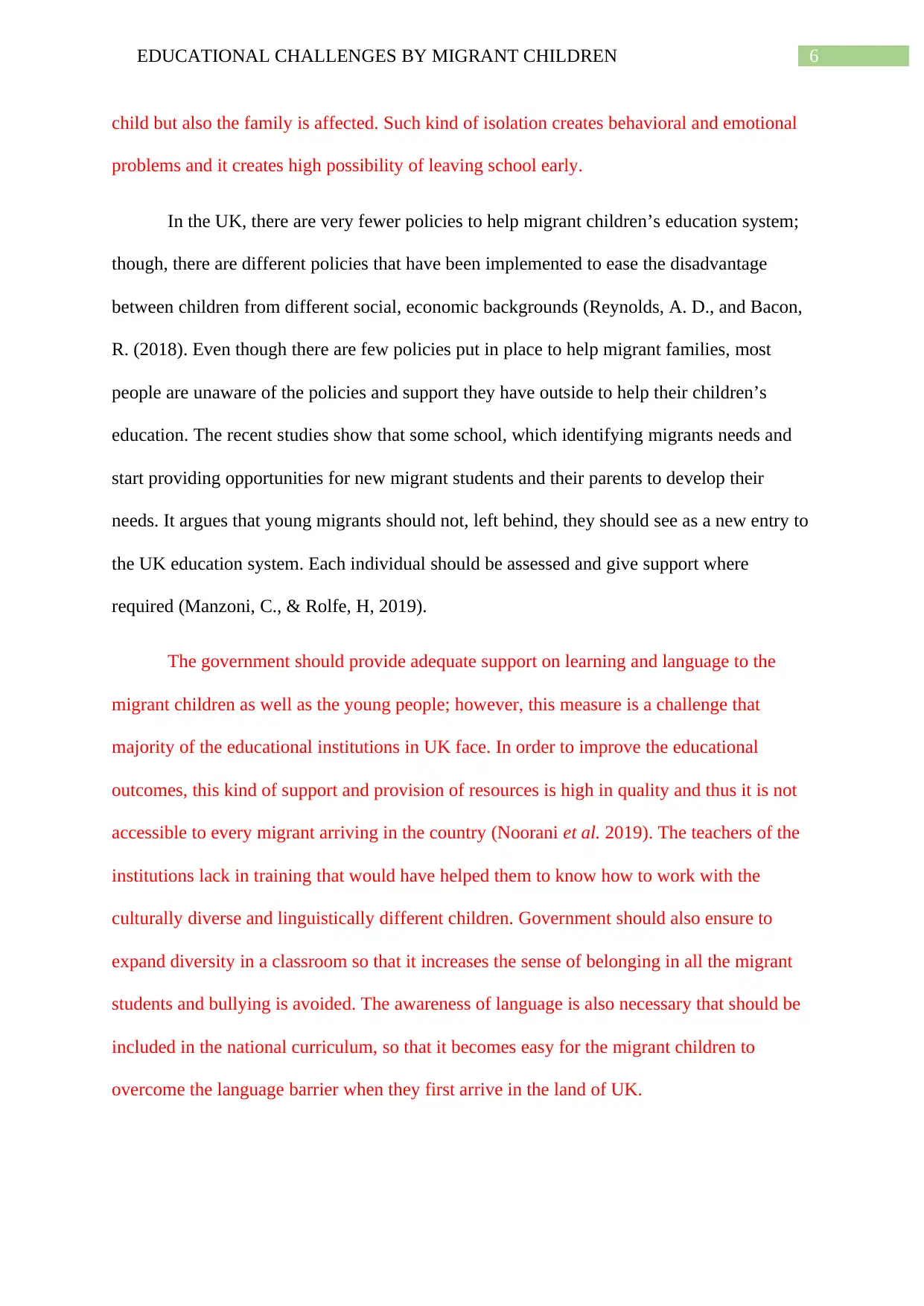
6EDUCATIONAL CHALLENGES BY MIGRANT CHILDREN
child but also the family is affected. Such kind of isolation creates behavioral and emotional
problems and it creates high possibility of leaving school early.
In the UK, there are very fewer policies to help migrant children’s education system;
though, there are different policies that have been implemented to ease the disadvantage
between children from different social, economic backgrounds (Reynolds, A. D., and Bacon,
R. (2018). Even though there are few policies put in place to help migrant families, most
people are unaware of the policies and support they have outside to help their children’s
education. The recent studies show that some school, which identifying migrants needs and
start providing opportunities for new migrant students and their parents to develop their
needs. It argues that young migrants should not, left behind, they should see as a new entry to
the UK education system. Each individual should be assessed and give support where
required (Manzoni, C., & Rolfe, H, 2019).
The government should provide adequate support on learning and language to the
migrant children as well as the young people; however, this measure is a challenge that
majority of the educational institutions in UK face. In order to improve the educational
outcomes, this kind of support and provision of resources is high in quality and thus it is not
accessible to every migrant arriving in the country (Noorani et al. 2019). The teachers of the
institutions lack in training that would have helped them to know how to work with the
culturally diverse and linguistically different children. Government should also ensure to
expand diversity in a classroom so that it increases the sense of belonging in all the migrant
students and bullying is avoided. The awareness of language is also necessary that should be
included in the national curriculum, so that it becomes easy for the migrant children to
overcome the language barrier when they first arrive in the land of UK.
child but also the family is affected. Such kind of isolation creates behavioral and emotional
problems and it creates high possibility of leaving school early.
In the UK, there are very fewer policies to help migrant children’s education system;
though, there are different policies that have been implemented to ease the disadvantage
between children from different social, economic backgrounds (Reynolds, A. D., and Bacon,
R. (2018). Even though there are few policies put in place to help migrant families, most
people are unaware of the policies and support they have outside to help their children’s
education. The recent studies show that some school, which identifying migrants needs and
start providing opportunities for new migrant students and their parents to develop their
needs. It argues that young migrants should not, left behind, they should see as a new entry to
the UK education system. Each individual should be assessed and give support where
required (Manzoni, C., & Rolfe, H, 2019).
The government should provide adequate support on learning and language to the
migrant children as well as the young people; however, this measure is a challenge that
majority of the educational institutions in UK face. In order to improve the educational
outcomes, this kind of support and provision of resources is high in quality and thus it is not
accessible to every migrant arriving in the country (Noorani et al. 2019). The teachers of the
institutions lack in training that would have helped them to know how to work with the
culturally diverse and linguistically different children. Government should also ensure to
expand diversity in a classroom so that it increases the sense of belonging in all the migrant
students and bullying is avoided. The awareness of language is also necessary that should be
included in the national curriculum, so that it becomes easy for the migrant children to
overcome the language barrier when they first arrive in the land of UK.
Paraphrase This Document
Need a fresh take? Get an instant paraphrase of this document with our AI Paraphraser
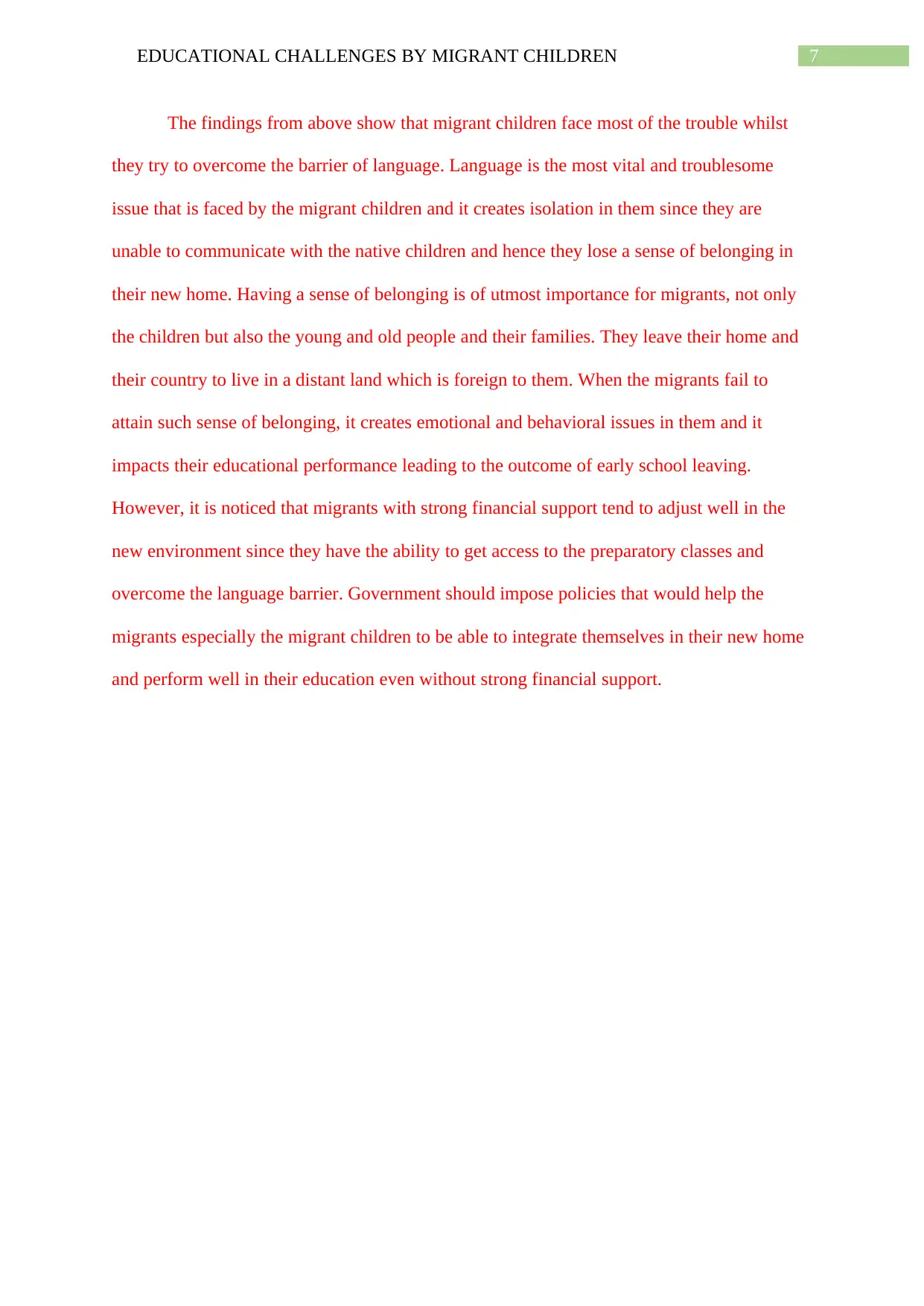
7EDUCATIONAL CHALLENGES BY MIGRANT CHILDREN
The findings from above show that migrant children face most of the trouble whilst
they try to overcome the barrier of language. Language is the most vital and troublesome
issue that is faced by the migrant children and it creates isolation in them since they are
unable to communicate with the native children and hence they lose a sense of belonging in
their new home. Having a sense of belonging is of utmost importance for migrants, not only
the children but also the young and old people and their families. They leave their home and
their country to live in a distant land which is foreign to them. When the migrants fail to
attain such sense of belonging, it creates emotional and behavioral issues in them and it
impacts their educational performance leading to the outcome of early school leaving.
However, it is noticed that migrants with strong financial support tend to adjust well in the
new environment since they have the ability to get access to the preparatory classes and
overcome the language barrier. Government should impose policies that would help the
migrants especially the migrant children to be able to integrate themselves in their new home
and perform well in their education even without strong financial support.
The findings from above show that migrant children face most of the trouble whilst
they try to overcome the barrier of language. Language is the most vital and troublesome
issue that is faced by the migrant children and it creates isolation in them since they are
unable to communicate with the native children and hence they lose a sense of belonging in
their new home. Having a sense of belonging is of utmost importance for migrants, not only
the children but also the young and old people and their families. They leave their home and
their country to live in a distant land which is foreign to them. When the migrants fail to
attain such sense of belonging, it creates emotional and behavioral issues in them and it
impacts their educational performance leading to the outcome of early school leaving.
However, it is noticed that migrants with strong financial support tend to adjust well in the
new environment since they have the ability to get access to the preparatory classes and
overcome the language barrier. Government should impose policies that would help the
migrants especially the migrant children to be able to integrate themselves in their new home
and perform well in their education even without strong financial support.
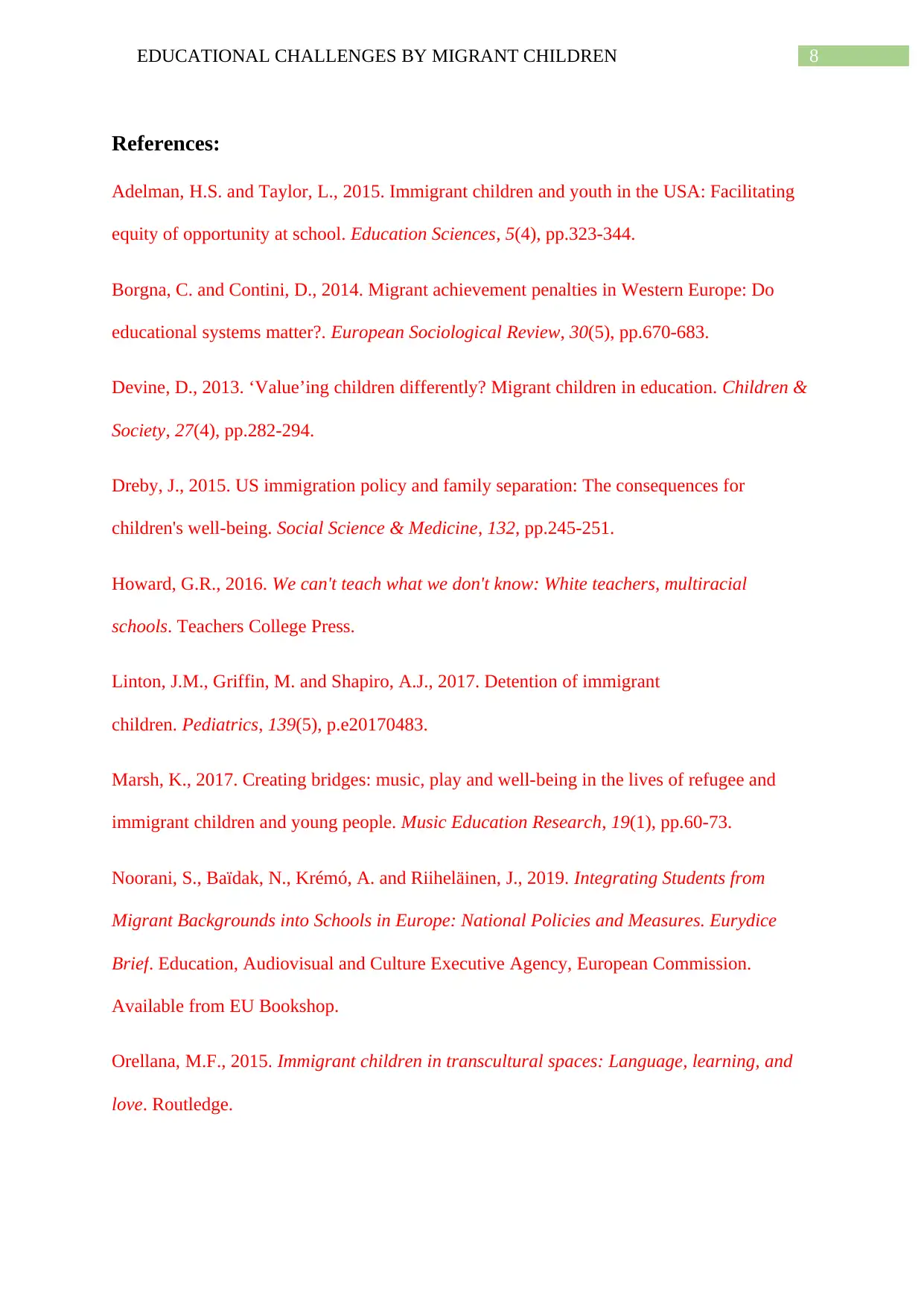
8EDUCATIONAL CHALLENGES BY MIGRANT CHILDREN
References:
Adelman, H.S. and Taylor, L., 2015. Immigrant children and youth in the USA: Facilitating
equity of opportunity at school. Education Sciences, 5(4), pp.323-344.
Borgna, C. and Contini, D., 2014. Migrant achievement penalties in Western Europe: Do
educational systems matter?. European Sociological Review, 30(5), pp.670-683.
Devine, D., 2013. ‘Value’ing children differently? Migrant children in education. Children &
Society, 27(4), pp.282-294.
Dreby, J., 2015. US immigration policy and family separation: The consequences for
children's well-being. Social Science & Medicine, 132, pp.245-251.
Howard, G.R., 2016. We can't teach what we don't know: White teachers, multiracial
schools. Teachers College Press.
Linton, J.M., Griffin, M. and Shapiro, A.J., 2017. Detention of immigrant
children. Pediatrics, 139(5), p.e20170483.
Marsh, K., 2017. Creating bridges: music, play and well-being in the lives of refugee and
immigrant children and young people. Music Education Research, 19(1), pp.60-73.
Noorani, S., Baïdak, N., Krémó, A. and Riiheläinen, J., 2019. Integrating Students from
Migrant Backgrounds into Schools in Europe: National Policies and Measures. Eurydice
Brief. Education, Audiovisual and Culture Executive Agency, European Commission.
Available from EU Bookshop.
Orellana, M.F., 2015. Immigrant children in transcultural spaces: Language, learning, and
love. Routledge.
References:
Adelman, H.S. and Taylor, L., 2015. Immigrant children and youth in the USA: Facilitating
equity of opportunity at school. Education Sciences, 5(4), pp.323-344.
Borgna, C. and Contini, D., 2014. Migrant achievement penalties in Western Europe: Do
educational systems matter?. European Sociological Review, 30(5), pp.670-683.
Devine, D., 2013. ‘Value’ing children differently? Migrant children in education. Children &
Society, 27(4), pp.282-294.
Dreby, J., 2015. US immigration policy and family separation: The consequences for
children's well-being. Social Science & Medicine, 132, pp.245-251.
Howard, G.R., 2016. We can't teach what we don't know: White teachers, multiracial
schools. Teachers College Press.
Linton, J.M., Griffin, M. and Shapiro, A.J., 2017. Detention of immigrant
children. Pediatrics, 139(5), p.e20170483.
Marsh, K., 2017. Creating bridges: music, play and well-being in the lives of refugee and
immigrant children and young people. Music Education Research, 19(1), pp.60-73.
Noorani, S., Baïdak, N., Krémó, A. and Riiheläinen, J., 2019. Integrating Students from
Migrant Backgrounds into Schools in Europe: National Policies and Measures. Eurydice
Brief. Education, Audiovisual and Culture Executive Agency, European Commission.
Available from EU Bookshop.
Orellana, M.F., 2015. Immigrant children in transcultural spaces: Language, learning, and
love. Routledge.
⊘ This is a preview!⊘
Do you want full access?
Subscribe today to unlock all pages.

Trusted by 1+ million students worldwide
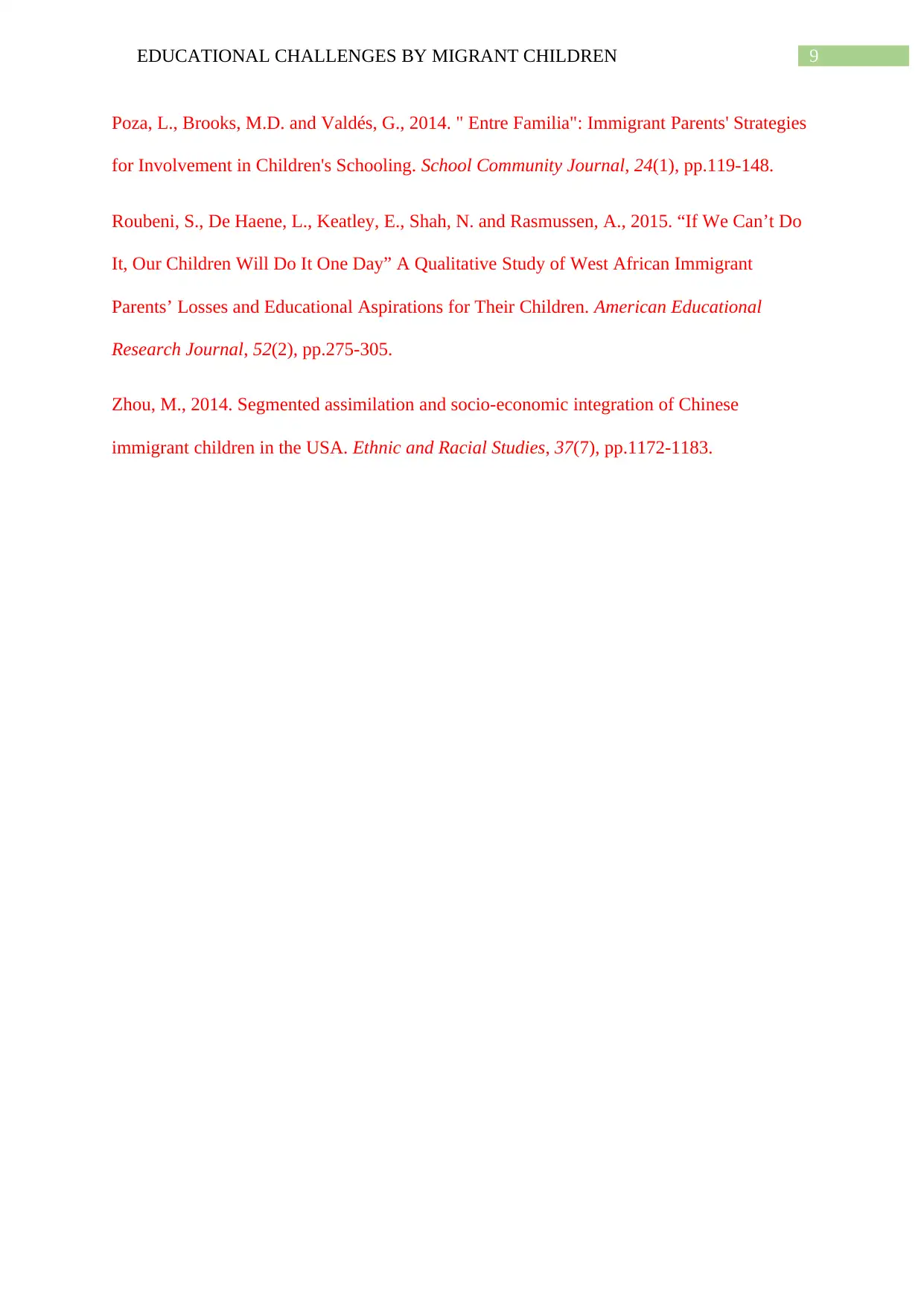
9EDUCATIONAL CHALLENGES BY MIGRANT CHILDREN
Poza, L., Brooks, M.D. and Valdés, G., 2014. " Entre Familia": Immigrant Parents' Strategies
for Involvement in Children's Schooling. School Community Journal, 24(1), pp.119-148.
Roubeni, S., De Haene, L., Keatley, E., Shah, N. and Rasmussen, A., 2015. “If We Can’t Do
It, Our Children Will Do It One Day” A Qualitative Study of West African Immigrant
Parents’ Losses and Educational Aspirations for Their Children. American Educational
Research Journal, 52(2), pp.275-305.
Zhou, M., 2014. Segmented assimilation and socio-economic integration of Chinese
immigrant children in the USA. Ethnic and Racial Studies, 37(7), pp.1172-1183.
Poza, L., Brooks, M.D. and Valdés, G., 2014. " Entre Familia": Immigrant Parents' Strategies
for Involvement in Children's Schooling. School Community Journal, 24(1), pp.119-148.
Roubeni, S., De Haene, L., Keatley, E., Shah, N. and Rasmussen, A., 2015. “If We Can’t Do
It, Our Children Will Do It One Day” A Qualitative Study of West African Immigrant
Parents’ Losses and Educational Aspirations for Their Children. American Educational
Research Journal, 52(2), pp.275-305.
Zhou, M., 2014. Segmented assimilation and socio-economic integration of Chinese
immigrant children in the USA. Ethnic and Racial Studies, 37(7), pp.1172-1183.
1 out of 10
Related Documents
Your All-in-One AI-Powered Toolkit for Academic Success.
+13062052269
info@desklib.com
Available 24*7 on WhatsApp / Email
![[object Object]](/_next/static/media/star-bottom.7253800d.svg)
Unlock your academic potential
Copyright © 2020–2026 A2Z Services. All Rights Reserved. Developed and managed by ZUCOL.




